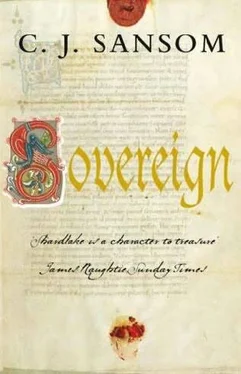‘Very true.’ Wrenne leaned back in his chair with a sigh. ‘And for the King to come and set his stamp on the north is an intelligent plan. I only say, sir, do not underestimate the currents that run here.’
I looked at the old man, wondering where his sympathies lay. I guessed that like many an aged student of the world’s affairs, he was past feeling any great passion. I changed the subject.
‘It seems we will be present at the King’s reception on Friday. Sir William Maleverer confirmed it to me yesterday at St Mary’s. We are to hand over the petitions.’
‘Yes, I have had a message. We are to take the petitions to the Office of the Great Chamberlain tomorrow. He will see us at nine and take us through our paces for the meeting with the King. He wants me to bring the petitions and the summary half an hour early so he can go through them. So I will start early for St Mary’s, and see you there at nine.’
‘I hope we will be properly rehearsed.’
‘I am sure we will. The Council will want everything to go with perfect smoothness.’ Wrenne smiled and shook his head. ‘By Jesu, to see the King at my age. That will be a strange thing.’
‘I confess I am not looking forward to it.’
‘We have only to perform our little duty. The King will barely notice us. But to see him. And that wondrous train of wagons a mile long. They’ve been bringing in hay to feed the horses from as far as Carlisle.’
‘It is very well organized. They even have a girl going round the town buying sweet doucets for the Queen.’ I told him of our encounter with Tamasin Reedbourne. Wrenne winked at Barak.
‘Pretty, was she?’
‘Fine enough, sir.’
Something struck me then. I remembered the girl had told me she had given her servant leave to choose some cloth for a new doublet from a shop. Yet he had come back empty-handed. I put the thought aside.
‘Well,’ Wrenne said, ‘we should begin work. The summaries need only be brief. We can start now and go on till we finish.’
‘Yes. I would not like to annoy the Chamberlain’s office. Nor Sir William Maleverer.’
Wrenne frowned. ‘Maleverer is a boor, for all he comes of an old Yorkshire family. He is like many of those appointed to the Council of the North since the Pilgrimage of Grace. Gentry who did not join the rebellion and now proclaim their loyalty to reform, but have no real religion beyond their own advancement. Ruthless and ambitious men. But tell me, sir, what did you see of the building at St Mary’s?’
‘It is extraordinary. Hundreds of carpenters and artists, building great pavilions. By the way, when was the monastery put down?’
‘Two years since. Abbot Thornton wrote to Cromwell asking for the monastery to be saved, or if it could not that he be granted lands and a pension. Which he was.’ The old man laughed cynically.
‘The abbots of the large houses were corrupt and greedy men.’
‘And now St Mary’s is the King’s, the abbot’s house renamed King’s Manor.’ Wrenne rubbed his hand across his cheek thoughtfully. ‘Perhaps we shall have an announcement the Queen is with child.’
‘The King would certainly welcome a second son.’
‘The royal succession.’ He smiled. ‘The bloodline of God’s anointed rolling down the ages. The head and soul of the realm, the peak of the chain of degree that binds man to man and keeps all safe.’
‘And where we lawyers hang somewhere in the middle, hoping to rise and fearing to fall.’
‘Ay.’ Wrenne laughed and waved a hand round the room. ‘See my table on its dais, nearest the fire, so that when the household servants lay their own table to dine they are lower down and further from the heat. All part of the great chain of earthly rank, this world’s great theatre. Well, so it must be, or we should have chaos.’ He winked conspiratorially. ‘Though I allow Madge to sit close to the fire, that she may warm her old bones.’

WE SPENT THE REST OF the day going through the petitions, breaking only for a dish of old Madge’s bland pottage. Some petitions were in elegant calligraphy, impressed with heavy wax seals, others mere scrawls on poor scraps of paper. Barak prepared brief summaries of the points at issue in each case at dictation from myself and Wrenne. The old man proved quick and decisive, ruthlessly separating the wheat from the chaff. Most were relatively trifling complaints against minor officials. We worked companionably, candles lit against the dull afternoon; the only sounds the falcon’s bell as it stirred on its perch and the occasional boom of the Minster bells.
Late in the afternoon Wrenne handed me a paper filled with a laboured scrawl. ‘This is interesting,’ he said.
The petition was from a farmer in the parish of Towton, outside the city. He had changed the use of his land from pasture to growing vegetables for the city, and his ploughmen kept digging up human bones which the church authorities commanded he deliver to the local churchyard for burial. He asked for the cost of his travelling to and fro, and time lost, to be defrayed.
‘Towton,’ I said. ‘There was a battle there, was there not?’
‘The greatest battle of the Wars between the Roses. 1461. There were thirty thousand dead in that bloody meadow. And now this farmer goes to law to be paid for delivering their bones for burial. What do you think we should do with the farmer’s claim?’
‘It is surely outside our jurisdiction. It is a church matter, it should go to the Minster dean.’
‘But the church is hardly likely to rule against its own interest and pay the man, is it?’ Barak interjected. ‘He should at least have representation.’
Wrenne took the petition back, smiling ruefully. ‘Yet Brother Shardlake is right, as a matter of canon law it falls outside the remit of petitions to the King. Church jurisdiction is a sensitive issue these days. The King would not wish to raise a storm on such a trifling issue. No, we must refer the farmer to the dean.’
‘I agree,’ I said.
Wrenne gave his wry smile again. ‘We must all be politicians now. And recognize the law has its limits. You must not expect too much of it, Master Barak.’

BY FIVE O’CLOCK we had all the petitions briefly summarized. It was getting dark, and I heard rain pattering on the windows. Wrenne looked over the summaries. ‘Yes,’ he said. ‘I think that is all clear.’
‘Good. And now, we must get back. We have some business at King’s Manor.’
Wrenne looked out of the window. ‘Let me lend you a coat, it is raining hard, pewling down as we say. Wait there a moment.’ He left us in the hall. We went and stood again by the fire.
‘He is a good old fellow,’ Barak said.
‘Ay.’ I stretched out my hands to warm them. ‘Lonely, I would guess. No one in the world but his old housekeeper and that bird.’ I nodded at the falcon, which had gone to sleep on its perch. Wrenne returned, bearing a coat, good and heavy but far too large for me, the hem nearly scraping the floor. I promised to return it on the morrow. We set off into the rain, to find out if poor young Green had said anything about a hiding place in Oldroyd’s wall.
WE WALKED THROUGH dark empty streets, tired again. The air was full of autumnal smells of wood-smoke and the dank odour of fallen leaves.
‘So you’ll see the King?’ Barak shook his head in wonder.
‘You never saw him when you worked for Cromwell?’
He laughed. ‘No, it was the back ways for the likes of me.’
‘Would you like to see him?’
Читать дальше














